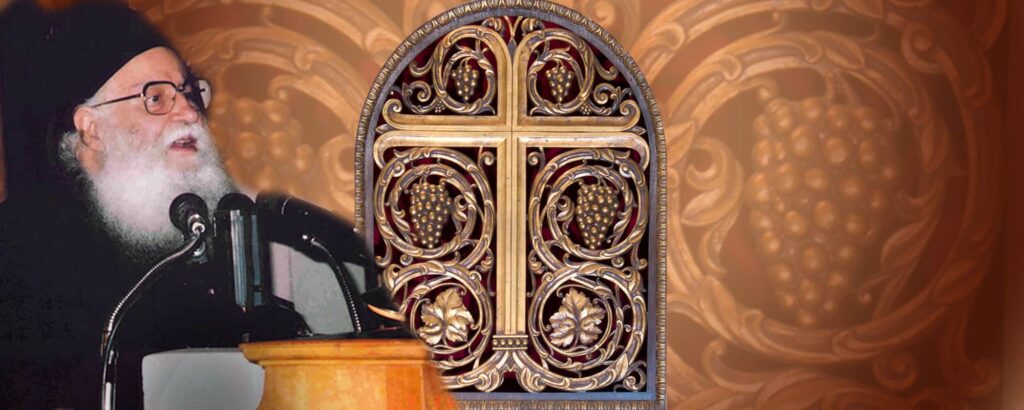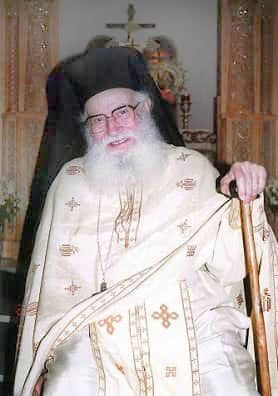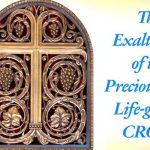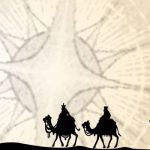
THE CROSS OF CHRIST, OUR ETERNAL GLORY
Homily of Blessed Elder Athanasios Mitilinaios
“THE CROSS OF CHRIST, OUR ETERNAL GLORY”
On September 14, my beloved, our Church celebrates the Universal elevation of the Precious Cross. On this day we remember the finding of the Precious Cross by Emperor Saint Constantine’s mother, Saint Helen, and its elevation high up from the pulpit by the then Patriarch of Jerusalem, Makarios, around 325.
In order to glorify and honor the Cross, our Church thought to make the feast of the Precious Cross an echo of Great Lent and Good Friday. She even placed the Feast of the Transfiguration 40 days before the Exaltation – 40 days – and it creates an echo of Great Lent.
In the New Testament it is written that the Transfiguration took place shortly before the Passion, that is, a few days before the 15th of the month of Nissan (about the middle of February or March). Moreover, the Church also appointed the two Sundays, the one preceding and the one following the feast, to contain hymnology and biblical readings related to the Precious Cross. Thus, these two Sundays stand as pillars of honor and they accompany the Great Feast.
If you ask, “Why all of this?” The answer is, all the theology of God’s love for man culminates in the sacrifice of Christ on the Cross. We hear from the Evangelist John:
“God so loved the world that He gave His only-begotten Son, that whoever believes in Him will not perish but will have eternal life.” (John 3:16) (Here “so” [οὕτω] in “God so loved the world”, means “immeasurably”)
Moreover, the Cross of Christ is the center of the Gospel. The Holy Cross is also at the center of spiritual life – the center, I emphasize and repeat – of the spiritual life. If you do not place the Precious Cross at the center of your life, then it is impossible both to understand, and much more, to experience spiritual life.
The things we consider spiritual life, allow me to say, are mud. They do not really constitute the spiritual life. Because, simply, many times the entire meaning of the Cross is missing.
If the Cross or the preaching of the Cross is taken away, then we have no salvation. This is why the Apostle Paul in his first letter to the Corinthians writes:
“The word of the Cross is foolishness to those who are perishing.” (1 Cor 1:18) (“word” here means preaching)
Those who ultimately remain unrepentant will, of course, be lost; they will not be saved. For them, the Precious Cross is foolishness. They say: “How is it possible for an incarnate God to be crucified?” And, of course, for the Jews, he says, it was a scandal (1 Cor 1:23): “For if He is Yahweh (the LORD, that is), The Lord of Glory, The Holy One of Israel (as the prophet Isaiah saw Him sitting on an elevated throne, Is. 6:1) how is it possible for Him to ever end up on the Cross? He is not a curse.” (Deut 21:23) This is a scandal to the Jews, which prevents them from returning to Christ.
“...but to us who are being saved it is the power of God.” (1 Cor 1:18)
Αnd certainly it is an expression of the love of God, the Father and the Son and the Holy Spirit, of the Holy Triune God, that is.
Through the Cross, my beloved, we re-enter Paradise that we had lost; it is the symbol of the world’s denial, because the world crucified Christ. Therefore, if we welcome the Cross, we essentially live in rejection of the world.
The Precious Cross is also the symbol of asceticism. Does not the Apostle say to the Philippians that for some Christians, their God is their belly (Phil. 3:19)? He is saying, “their God is, ‘what will we eat, what we will drink’ and what will we wear’” (Mt 6:31), and he calls them enemies of the Cross of Christ (Phil. 3:18). Why? Simply because they have rejected asceticism and, consequently, the Holy Cross.
Moreover, the Precious Cross of Christ is the Tree of Life. Notice, it says in Scripture, “God planted two trees in Paradise, the one tree was the knowledge of good and evil and the other tree was of life.” (Gen. 2:9) (Paradise, I remind you, was upon the Earth. The word “Paradise” is Persian and means “big garden” and it was between two rivers, the Euphrates and the Tigris.)
And He said to the first-formed man: “You are not to try the fruit from the tree of knowledge” (Gen 2:17). Those who were tricked by the devil tried it, despite God’s warning, “the day you eat it, you will die” (Gen 2:17, 3:3). And God expelled them from Paradise. Paradise was a particular place; the rest of our planet was called Earth. This place was called Paradise. It was a symbol of the Kingdom of God. (Today we can go there, it is today’s Iraq, if you will.) Paradise was a symbol. The one tree which deceived them, from which they ate fruit, led them to death.
The love of God expelled them so that they would not go near the tree of life, for then, evil would become, as the Holy Fathers say, immortal. Thus, He reserved the fruit of the Tree of Life for later.
And what is the Tree of Life? It is Jesus Christ, my beloved. Or, if you will, it is the Cross. And just as fruit hung on the tree of life in Paradise, here Christ hangs on the Cross. Therefore, if we do not eat the fruit of the Tree of Life and do not have this as a rule, we sin. It is the opposite of what it was then. So then, what is the fruit? The Body and Blood of Christ, and with It we have life, eternal life.
You see, therefore, how all of these things prefigured, how they prepared man beforehand, for the coming of the Son of God, His Incarnation into this world. Now, therefore, in order to live, we must eat the Fruit of the Tree of Life (the Precious Cross), His Body and His Blood.
Having a knowledge about the Holy Cross, what we have said thus far, reveals to us the magnitude of the love of God and it is the key to our re-entry into the Kingdom of God.
This is how we turn back to the Kingdom of God. But the Kingdom of God is far better and far happier than the ancient Paradise. In other words, it is the kingdom of immortality and incorruption.
The Apostle Paul said the following to the Galatians: “Far be it for me to boast in anything except the Cross of our Lord Jesus Christ, by which the world has been crucified to me, and I to the world” (Gal. 6:14). Here “the world” means the worldly thinking, that which strikes at the Philippians, whom I told you previously, “their god is their belly” (Phil. 3:19). The mind of the flesh, to think in worldly ways, this has died for me, Paul. I too have died for the world.
This is very important indeed. It shows us the way, how to live the exact same way. So, the boast of Paul, and indeed Paul’s only boast, is the Cross of Christ – the crucified Christ! For we are often embarassed to say that we worship a crucified God.
Saint Cyril of Jerusalem, in his Catechisms, refers to the Holy Cross, specifically in his 13th Catechism. We will read a small selection of quotations on what he says about the Precious Cross. Pay attention. He writes:
“The boast of the catholic Church, the boast of boasts of all the works Jesus is the Cross; the Church regards every work of Jesus as boastworthy, but the boast of boasts is the Cross.”
St. Cyril explains further:
“And do not marvel if the whole universe was redeemed; for it was not a bared man, but the only-begotten Son of God who died on its behalf.”
To put it simply, He who was crucified was not a mere man, a mere naked man. But what was He? The Son of God, who incarnated, the only-begotten, who died for us all.”
St. Cyril also writes:
“Let us not then be ashamed of the Cross of our Savior, but rather glory in it.”
Look how things have changed. Look how the devil has succeeded in making us make our Cross secretly, so that others will not see us and say that we are Christians. Are you not Baptized? Are you not a Christian? Why do you hide this, your status?
And as I have related to you many times, when they pass by somewhere, a church for example, they make their cross under their jacket. My beloved, if someone invites you to dinner where some believe and others do not, you make your cross and then begin to eat. Do you go out to eat? Do you make the sign of the Cross at restaurants? But why not? Because we accept the benefaction, the food, but refuse to make a confession of faith? Is this not inconsistent? What will we do? We will make our cross. And we will also say a prayer, “The Lord’s prayer”, for example, if we go out for lunch.
This is what Saint Cyril says, that we should not be ashamed of the Precious Cross, but we must, through the Precious Cross, confess our faith in Christ. He continues:
“I confess the Cross because I know of the Resurrection; for if He endured crucifixion and had remained as He was, perhaps I would not have confessed it; I might have concealed both it and my Teacher; but now that the Resurrection has followed the Cross, I am not ashamed to declare it, because the Teacher died upon the Cross.”
And since we know He was crucified between two robbers, He might even have been viewed as an arch-robber. Saint Cyril continues:
“Whoever does not believe in the power of the crucifixion, ask the demons.”
This is a very good argument, even if indirect. We should not dwell on this, but in this case, by concession, we can.
“Whoever does not believe the words, believe what he sees.” (Jn 10:38)
Like what? Like what happens with fortune-tellers. When the Demons flee.
It happens all the time. A woman or a man goes to the medium, to the fortune teller’s little table. And there (it’s frightening what happens), let’s say it’s a woman who is a medium (medium means “intermediary”). She says to you right away, “My good lady, take off the cross that you have around your neck.” Why? Because the demons informed her that they would not reveal anything to her unless her client takes off the cross.
Is this not proof? The demons are frightened, they tremble and hit the road before the Cross of Christ. All of this shows that when we go to the Precious Cross, we strike the demons with a bolt of lightning.
It happens at times with the demon-possessed also, as it happened with that demon-possessed man in the Gospel: “What have You to do with us, Jesus, Son of God!” (Mark 1:24)
Do you see how the demons are frightened? Not just then, in the Gospel passage where it is recorded, but also today as I explained to you. Just go to the witch. She’ll tell you to take off your cross or whatever else.
St. Cyril continues:
“Many have been crucified throughout the world,” (it was the Roman mode of executing convicts) “but when they see even the Sign of the Cross of Christ, who was crucified for us, they shudder.”
He is saying, there were other ways the Romans executed prisoners, but none of the demons were frightened by any of them. But just seeing the sign of Christ crucified, the demons flee. They hit the road and flee, only by seeing the Cross, not just Christ.
He continues:
“For those men died for their own sins, but Christ for the sins of others.”
The death on the Cross is not ostensible. This is why the Apostle Paul says, “He died under Pontius Pilate”, truly. And look what he says: “according to the Scriptures.” (1 Tim 13:6, 1 Cor 15:3-4) We took this and have it in the Creed.
In other words, he is saying, The Cross was not a myth, an imagination, and afterwards, neither was the deliverance, for then salvation would also be an imagination. The death was not a myth. Christ truly died on the Cross. Therefore the Passion is true. Christ truly suffered on the Cross. And because the Resurrection is true, for He was also truly crucified, we are not ashamed. He was crucified, and we will not deny it, but will boast about it, and If I reject it now, will I not be reproached by Golgotha which is near me?” (St. Cyril of Jerusalem was bishop of Jerusalem when he wrote this in around 350 A.D. He is saying, “Look there, Golgotha is right next to us!”)
It is an awesome tradition that Jesus died on the Cross. “I am reproached by the wood of the Cross”, the one found by Saint Helen only 25 years prior to St. Cyril’s writing.
“The wood of the Cross reproaches me”, he says, every little piece all over the world. (It was cut into very very small pieces and distributed. Today the largest fragment of the Precious Cross is found on Mount Athos.)
He says,
“Do you wish to know clearly that the Cross is the glory of Jesus? Hear the Lord say it Himself: “The time has come for the Son of Man to be glorified.” (Jn 12:23) He said this to His disciples shortly before He was crucified. Do you see the glory of the Cross? He knows that His glory is the Cross. If, therefore, He considers it a glory that He has done the will of the Father, and by His Cross He saves the world, why should I be ashamed?”
Beloved, the Apostle Paul writes: “It is Christ with whom I am crucified.” (Gal 2:20) And if the glory of Jesus is the Cross, then whoever is crucified with Jesus is glorified also. All the Saints took up their Cross and were glorified. Our glory, therefore, is the Cross of Christ.
These days, as I told you, there are many who, unfortunately, reject the Cross because they reject Christ.
Thus our confession and our boasting about the Cross of Christ began for us many years back, to the era of Paul and the proto-martyrs. The sign of the Cross, made properly, is an expression of this glory and is our boast.
One time a man came here and received communion making a caricature of the sign of Cross.1 Beloved, we will make our cross correctly. Correctly. Did you hear? Correctly. It became a caricature. It has become like this everywhere, hiding that we make our Cross.
So then, we will make the sign of the Cross at any place and time, before the eyes of believers and unbelievers.
Let us then close with the Apostolic reading from Saint Paul:
“But God forbid that I should glory in anything but the Cross of our Lord Jesus Christ, by whom the world is crucified to me, and I to the world.” (Gal 6:14)
Amen.
GLORY BE TO THE HOLY AND TRIUNE GOD
- Perhaps Fr. Athanasios means what is known to some as "the bouzouki cross", a cross made three times with a very rapid circular motion over the breast, where a bouzouki player might strike his instrument with a pick.
Translated, edited, adapted, and added emphases by Anthony Hatzidakis
Sources:
- The Greek homily text used for this translation was taken from aktines.blogspot.com, digitally transcribed and edited by Eleni Linardaki, philologist, from a hand-written transcription by Mr. Athanasios K.
- Original homily audio source referenced
- Some quotations from Saint Cyril’s homily 13 were taken from NewAdvent.org and edited.



